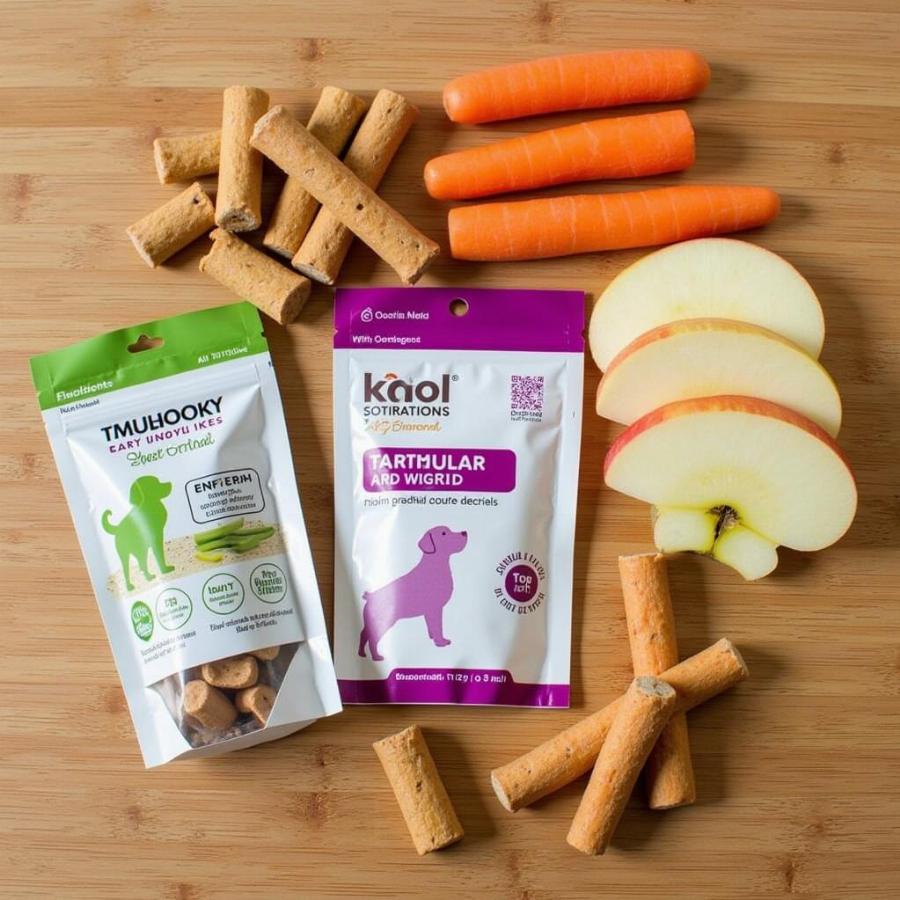Giving your dog a hambone seems like a classic treat, but is it safe? The short answer is: it depends. While the image of a happy dog gnawing on a bone is endearing, feeding your dog the wrong type of bone can be extremely dangerous. This article will delve into the complexities of giving bones to dogs, discussing the potential risks and benefits, and guiding you towards making informed decisions for your furry friend’s health.
Understanding the Risks of Giving Dogs Bones
While bones can provide some benefits like dental cleaning and mental stimulation, they also pose significant risks. Cooked bones, especially cooked hambones, are a major no-no. They become brittle and can easily splinter, causing choking hazards, internal punctures, or blockages in the digestive tract. Even raw bones aren’t entirely risk-free. They can also cause dental fractures, especially in aggressive chewers.
Safe Alternatives to Hambones for Dogs
So, what can you give your dog instead of a hambone? Thankfully, there are many safer and equally enjoyable alternatives. Chew toys specifically designed for dogs come in various shapes, sizes, and materials, catering to different chewing styles and preferences. Look for durable, non-toxic options made from materials like nylon or rubber.
What About Rawhide?
Rawhide chews are popular, but they also come with potential risks. Some dogs can digest rawhide easily, while others may experience digestive upset or blockages. If you choose to give rawhide, opt for high-quality products and supervise your dog while they chew.
Can Dogs Eat Cooked Ham Bones? The Definitive Answer
The answer is a resounding NO. Cooked ham bones, like other cooked bones, are extremely dangerous for dogs. They splinter easily, creating sharp fragments that can cause serious internal injuries. Never give your dog cooked hambones, no matter how much they beg!
Providing Safe and Healthy Treats for Your Dog
Keeping your dog happy and healthy involves providing appropriate and safe treats. Instead of risky bones, consider healthy alternatives like carrots, apples (without the core and seeds), or commercially available dog treats made from natural ingredients. Always check the ingredient list and choose treats that are appropriate for your dog’s size and age.  Thực phẩm an toàn cho chó
Thực phẩm an toàn cho chó
What if My Dog Swallows a Hambone?
If your dog swallows a hambone, contact your veterinarian immediately. This is a serious situation that requires professional attention. Symptoms to watch for include vomiting, diarrhea, abdominal pain, and difficulty defecating.
Choosing the Right Chews for Your Dog’s Needs
Every dog is unique, and their chewing habits vary. Consider factors like your dog’s size, age, and chewing strength when choosing chews. For aggressive chewers, opt for extremely durable toys. For puppies, choose softer options that won’t damage their developing teeth.
Conclusion: Keeping Your Dog Safe and Happy Without Hambones
While the idea of giving your dog a hambone might seem appealing, it’s crucial to prioritize their safety. Cooked hambones pose serious health risks, and even raw bones aren’t entirely safe. Fortunately, there are plenty of safe and enjoyable alternatives that will keep your furry friend entertained and satisfied without compromising their health. Choose wisely, and your dog will thank you for it.
FAQ: Common Questions About Dogs and Bones
- Are all bones bad for dogs? Cooked bones are definitely bad for dogs. Raw bones can be acceptable with careful supervision and selection.
- What should I do if my dog cracks a tooth on a bone? Contact your veterinarian immediately.
- Are there any benefits to giving dogs bones? Raw bones can provide some dental benefits and mental stimulation, but the risks often outweigh the rewards.
- What are the best alternatives to bones for dogs? Durable chew toys and healthy treats like carrots and apples are great options.
- Can puppies have bones? Puppies should not be given bones, as their teeth are still developing.
- What are the signs of a bone-related injury in dogs? Vomiting, diarrhea, abdominal pain, and difficulty defecating are all potential signs of trouble.
- What kind of chew toys are best for aggressive chewers? Look for extremely durable toys made from materials like nylon or hard rubber.
Explore More Dog Care Tips on Beaut Dogs
Looking for more helpful advice on dog care? Check out these related articles on our website:
Beaut Dogs is your trusted source for all things related to dog care. We provide comprehensive information and expert advice to help you raise a happy and healthy canine companion. For personalized support, contact us at Email: [email protected]. Beaut Dogs is here to answer your questions and provide expert guidance.